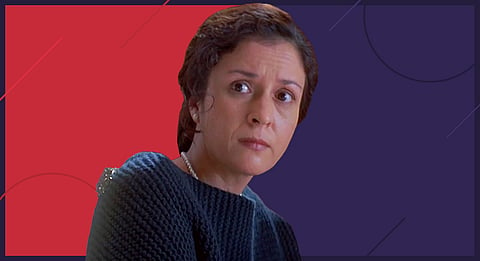
- Reviews
- Power List 2024
- Cannes 2024
- In-Depth Stories
- Web Stories
- News
- FC Lists
- Interviews
- Features
- FC SpecialsFC Specials

In this weekly series, Rahul Desai lists 50 of Hindi cinema's favourite "third wheels" – that is, memorable characters whose roles are little more than fleeting cameos and little less than supporting turns – since 1990. There will be no particular order: just a colourful recollection of emblematic faces who've left us craving for more.
In a film furiously centered on a relationship designed to provoke career-best turns by stars such as Amitabh Bachchan and Rani Mukerji, it's often difficult to identify much else by way of supporting performances. Yet, Sanjay Leela Bhansali's Black is a rare cinematic beast – in that it equips the two differently-abled protagonists with the power to shine, or crash, solely through the mechanics of their multifaceted environment. The aggressive eccentricities of teacher Debraj Sahai aside, much of our sentimental investment in the against-all-odds underdog journey of blind-and-deaf Michelle McNally is accelerated by the stricken characters of her immediate family.
There's the envious younger sister, Sarah (Nandana Sen), who is frustrated with her own fate – of not being able to develop an ordinary sibling rivalry with Michelle, the "special" center of everyone's attention. There's the tragically pragmatic father, Paul (Dhritiman Chaterji), who, like most Indian parents, is the last to believe in his daughter but the first to find peace in her success.
But it's the mother, Catherine McNally, brought to life so sensitively by stage veteran Shernaz Patel, who lends the film some of its most poignant moments with little more than her anguished eyes. Mrs. McNally – one can still hear Amitabh Bachchan's booming, breathless voice echo across the Shimla mansion and address her in different volumes of stress – serves as the emotional prism through which Bhansali wants us to view a wild Michelle being tamed. All through, she reacts the way he wants us to.
On one hand, we see a protective mother pained by the fact that Michelle is now beyond her control and influence, and on the other we see a tough woman in complete awe of a young lady and her relentless teacher. It's almost as if she were watching their movie unfold, despite being inside it. Her face, at any point during Michelle's life, reflects the precise emotions that directors usually communicate to us through a background score. Patel enacts her in a way that not once does it occur to us that the McNally family is in fact a privileged one – wealthy, quasi-colonial and dismissive of unconventionality until Debraj, who amounts to nothing less than a witch doctor for them, becomes their last resort.
Oddly enough, we live in a time where the stories of rich, high-society families are frowned upon as "first-world problems". Yet, Mrs. McNally bridges that gap with the kind of unconditional, desperate love that allows the focus to remain on the humbling humanity – and not lavish physicality – of Black. Even in Bhansali's next, Guzaarish, as a lawyer and the only friend who believes in a quadriplegic's battle for the right to die, Patel is again the device designed to earn our empathy (and not sympathy) for the suffering protagonist.
I believe most directors haven't figured out how to utilize someone of her frightening talent. Except for a few fleeting reminders – watch her alongside Naseeruddin Shah in a lovely short called INTERIOR CAFÉ NIGHT, or even as a camouflaged witch in the Ruskin Bond adaptation, The Black Cat – perhaps it's O.K. to accept that cinema's loss has always been Indian theatre's gain.
Unless, of course, Bhansali decides to pause his obsession of historical period dramas in order to extend the universe of his impassioned "differently-abled" trilogy (Khamoshi, Black, Guzaarish).
Perhaps the most exquisitely timed "teardrop" in the history of Hindi cinema occurs with Mrs. McNally at her expressive best. In the famous garden scene of Black, while an enraged Debraj manhandles little Michelle between the fountain and the bushes to drum in his lessons, Catherine is in a race against time to subdue her husband and rid Debraj of his "job". Notice her, however, during the magic moment when Michelle – the girl who, everyone, including loyal Catherine, had lost hope in – says her first word. There is victory for everyone here – most of all, the alcoholic, drifting teacher who has finally found a purpose in life.
But the violin kicks in beautifully in sync with Catherine's lone tear – one that distinguishes her joy from the "regular" joy of a parent celebrating their baby's first sense. While Paul is at a loss of how to express his elation – he almost claps, unlike the stiff aristocrat he is – Catherine says nothing. She is not only overwhelmed, but also silently apologetic about not believing in her little girl, and not trusting the man she had hired to light up her darkness.